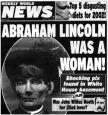The Enquiring Minds of Tabloid Readers
April 25, 2007 at 12:57 pm | Posted in celebrity, pop culture, romance, tabloids | 1 Comment Bird,S. Elizabeth (1992). For Enquiring Minds: A Cultural Study of Supermarket Tabloids. Knoxville, TN:University of Tennessee Press.
Bird,S. Elizabeth (1992). For Enquiring Minds: A Cultural Study of Supermarket Tabloids. Knoxville, TN:University of Tennessee Press.
Radway, Janice (1984) Reading the Romance: Women, Patriarchy, and Popular Literature. Chapel Hill,N.C.:Univ. of North Carolina Press
Here’s a front page shocker– Why do more than 50 million weekly readers pay big money ($3.29 + cover)for tabloids, when free online information on everything is available 24/7?
For more than a century, tabloids have been maligned as publishing’s seamy underbelly. They’ve been universally panned as  journalistic sleaze–sensational claptrap calculated to pander to our baser instincts. Yet, tabloids are not only holding their own in 2007, but one could argue that their “cult of celebrity” approach has moved from street cred to legitimacy in popular culture. Skeptical? Over the next week, count how many more entertainment than “hard news” stories are served up on the average TV and radio news show. While the CBS News doesn’t share the Enquirer’s obsession with Brangelina, they too have gone over to the dark side-the age of infotainment.
journalistic sleaze–sensational claptrap calculated to pander to our baser instincts. Yet, tabloids are not only holding their own in 2007, but one could argue that their “cult of celebrity” approach has moved from street cred to legitimacy in popular culture. Skeptical? Over the next week, count how many more entertainment than “hard news” stories are served up on the average TV and radio news show. While the CBS News doesn’t share the Enquirer’s obsession with Brangelina, they too have gone over to the dark side-the age of infotainment.
As Professor Bird (1992) observed, “The tabloids clearly offer millions of Americans something they don’t find in other media”. Bird explored tabloids’ enduring appeal by interviewing this genre’s readers and writers, as well as analyzing the thematic content of major American tabloids.
 Why do people read tabloids ? There are those, like Agent K from Men in Black(1997) who claim they
Why do people read tabloids ? There are those, like Agent K from Men in Black(1997) who claim they  offer the “best damn investigative reporting on the planet” (especially on celebrity shapeshifters). Despite the quip’s absurdity, it resonates with those who feel disenfranchised and suspicious of social institutions. For these readers, it is an act of defiance. They affirm their individuality by embracing what the popular culture rejects as trash. For others, it is an act of play, to revel in tabloids’ preposterous excess. The Weekly World News offers the most “amazing oddities” stories of the “Ripley’s Believe or Not” tradition. It is also an acknowledged parody publication (http://www.weeklyworldnews.com/bat_boy/ ).
offer the “best damn investigative reporting on the planet” (especially on celebrity shapeshifters). Despite the quip’s absurdity, it resonates with those who feel disenfranchised and suspicious of social institutions. For these readers, it is an act of defiance. They affirm their individuality by embracing what the popular culture rejects as trash. For others, it is an act of play, to revel in tabloids’ preposterous excess. The Weekly World News offers the most “amazing oddities” stories of the “Ripley’s Believe or Not” tradition. It is also an acknowledged parody publication (http://www.weeklyworldnews.com/bat_boy/ ).
Most of Bird’s readers don’t literally believe what they see in tabloids. They selectively filter content into credible stories (celebrity gossip), inspirational stories (rags to riches, heroic pets..)and fun stories (lose a ton overnight).
They selectively filter content into credible stories (celebrity gossip), inspirational stories (rags to riches, heroic pets..)and fun stories (lose a ton overnight).
Bird’s tabloid readers enjoy their genre for many of the reasons expressed by romance readers( Radway,1984) For both, the act of reading was empowering and exhilarating. It was one part of their lives that they could control, and this realization filled them with a guilty pleasure. Tabloids and romances offer the allure of escape–to experience vicariously fame, glamour and an exotic life. They’re both reassuring, but for different reasons. Since 80%+ of tabloid stories stress the downside of celebrity (Bird, 1992), it makes us feel a whole lot better about being anonymous and financially-challenged. For romance the reassurance is that love will find you and conquer all.
 Both genres are populist, upbeat and express traditional, family-centered values. They have strict conventions and a “horizon of expectation” but are not religiously conservative overall. Romance values the monogamous, committed relationship. The role of tabloids is to judge and punish the corrupt (-homewreckers, liars and thieves) by public exposure of their evil. Tabloids have expanded their tolerance for diversity since Bird reported their homophobic, white, lower middle class tendencies in 1992. In April 2007, two cover National Enquirer stories were about a secret gay lover and about a fired black Grey’s Anatomy actor. While tabloids and
Both genres are populist, upbeat and express traditional, family-centered values. They have strict conventions and a “horizon of expectation” but are not religiously conservative overall. Romance values the monogamous, committed relationship. The role of tabloids is to judge and punish the corrupt (-homewreckers, liars and thieves) by public exposure of their evil. Tabloids have expanded their tolerance for diversity since Bird reported their homophobic, white, lower middle class tendencies in 1992. In April 2007, two cover National Enquirer stories were about a secret gay lover and about a fired black Grey’s Anatomy actor. While tabloids and  traditional newspapers are both moving to the popular culture center, tabloids are no impartial forum for political and social commentary. How can they be, as long as they pay informants for exclusives?
traditional newspapers are both moving to the popular culture center, tabloids are no impartial forum for political and social commentary. How can they be, as long as they pay informants for exclusives?
Both create an intimacy or rapport with their readers. Tabloids achieve this intimacy through shared secrets interwoven with heart-warming human interest stories. Finally, romance and tabloid reader expressed embarrassment about being seen publicly with their genre. After all, if what they’re reading is trash, then does that make the readers trash too?
Blog at WordPress.com.
Entries and comments feeds.
